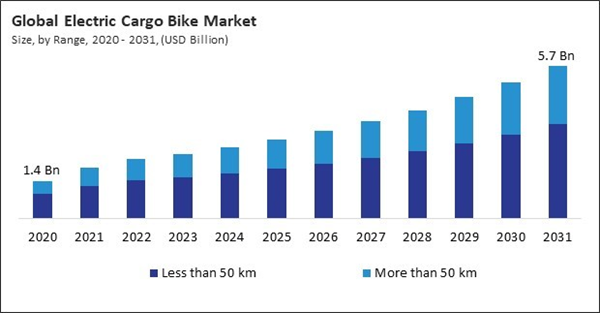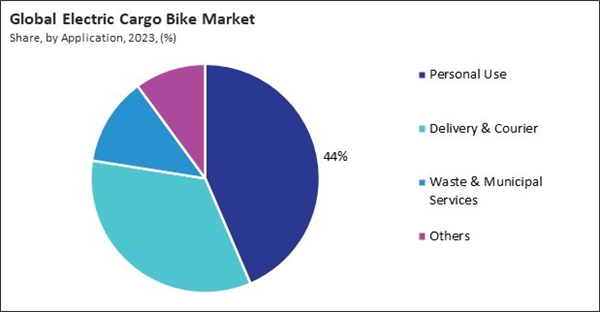Online shopping has experienced significant growth and is expected to continue expanding in the coming years. By 2027, experts predict that 22% of total retail sales, amounting to over $7.5 trillion, will be conducted online. The boom in e-commerce has fundamentally reshaped the retail landscape, driving a surge in demand for efficient and sustainable delivery solutions. Therefore, Delivery & Courier segment would capture 1/3rd revenue share in the market by the year 2031. The increasing prevalence of online shopping, particularly in urban regions, has generated a greater demand for delivery alternatives that are prompt, dependable, and ecologically sustainable.
Regulatory support plays a crucial role in shaping sustainable transportation initiatives globally. Cities and governments worldwide increasingly recognize the importance of promoting eco-friendly modes of transport to combat pollution and reduce carbon emissions. One common strategy is the implementation of dedicated bike lanes, which encourage cycling and make it safer and more convenient.
Additionally, substantial progress in technology has been instrumental in the conversion of electric cargo bikes into a viable and attractive alternative for commercial applications. One of the key areas of improvement has been in battery technology. Electric cargo bikes are now capable of traversing greater distances on a solitary charge, owing to the substantial range enhancements brought about by the development of powerful, lightweight batteries. Therefore, the combination of advancements in battery technology, electric motor efficiency, and load capacities has made electric cargo bikes more practical and appealing for commercial use, increasing the demand for these bikes.
However, Electric cargo bikes encounter stiff competition from various other transportation modes, including cars, vans, and traditional bicycles, all of which contribute to limiting their market share. Cars and vans, with their larger carrying capacities and higher speeds, are often perceived as more convenient for transporting goods over longer distances or in areas with less developed cycling infrastructure. Thus, the electric cargo bike market faces significant competition from other modes of transport.
Range Outlook
By range, the electric cargo bike market is divided into less than 50 km and more than 50 km. The less than 50 km segment witnessed 64% revenue share in the electric cargo bike market in 2023. Electric cargo bikes with less than 50 km range are well-suited for last-mile delivery services, where goods must be transported from a distribution center to the final destination. Bikes in this range have lower maintenance costs and no fuel expenses.Application Outlook
On the basis of application, the electric cargo bike market is classified into personal use, delivery & courier, waste & municipal services, and others. The delivery & courier segment recorded 34% revenue share in the electric cargo bike market in 2023. Courier companies and e-commerce retailers use electric cargo bikes to deliver customer parcels. The cargo capacity of these bikes allows them to carry multiple parcels at once, reducing the number of trips required to complete deliveries.Type Outlook
Based on type, the electric cargo bike market is bifurcated into front loader and longtail. The front loader segment garnered 58% revenue share in the electric cargo bike market in 2023. The front loader refers to bikes where the cargo area is in front of the rider, between the handlebars and the front wheel. Designed to facilitate access to the cargo area and provide exceptional visibility, this model is ideal for transporting larger or bulkier items.Regional Outlook
Region-wise, the market is analysed across North America, Europe, Asia Pacific, and LAMEA. The Asia Pacific segment procured 43% revenue share in the market in 2023. The Asia-Pacific region is experiencing rapid urbanization and a surge in e-commerce activities. As more people migrate to urban areas and online shopping becomes increasingly popular, there is a growing need for efficient and sustainable logistics solutions to fulfil the rising demand for goods delivery. Electric cargo bikes offer a cost-effective and flexible solution for last-mile delivery in urban areas, making them attractive to e-commerce businesses and delivery service providers.List of Key Companies Profiled
- Yuba Bikes
- Mobility Holdings, Limited (Tern)
- Amsterdam Bicycle Company BV
- Avant Enterprises, Inc. (Aventon)
- Priority Outdoor Products, LLC
- Riese & Müller GmbH
- Bunch Bikes, Inc.
- Pon Holdings B.V. (Houdstermaatschappij Wilg B.V.)
- Rad Power Bikes Inc.
- RYTLE Mobility GmbH
Market Report Segmentation
By Range
- Less than 50 km
- More than 50 km
By Application
- Personal Use
- Delivery & Courier
- Waste & Municipal Services
- Others
By Type
- Front Loader
- Longtail
By Geography
- North America
- US
- Canada
- Mexico
- Rest of North America
- Europe
- Germany
- UK
- France
- Russia
- Spain
- Italy
- Rest of Europe
- Asia Pacific
- China
- Japan
- India
- South Korea
- Singapore
- Malaysia
- Rest of Asia Pacific
- LAMEA
- Brazil
- Argentina
- UAE
- Saudi Arabia
- South Africa
- Nigeria
- Rest of LAMEA
Table of Contents
Companies Mentioned
- Yuba Bikes
- Mobility Holdings, Limited (Tern)
- Amsterdam Bicycle Company BV
- Avant Enterprises, Inc. (Aventon)
- Priority Outdoor Products, LLC
- Riese & Müller GmbH
- Bunch Bikes, Inc.
- Pon Holdings B.V. (Houdstermaatschappij Wilg B.V.)
- Rad Power Bikes Inc.
- RYTLE Mobility GmbH










